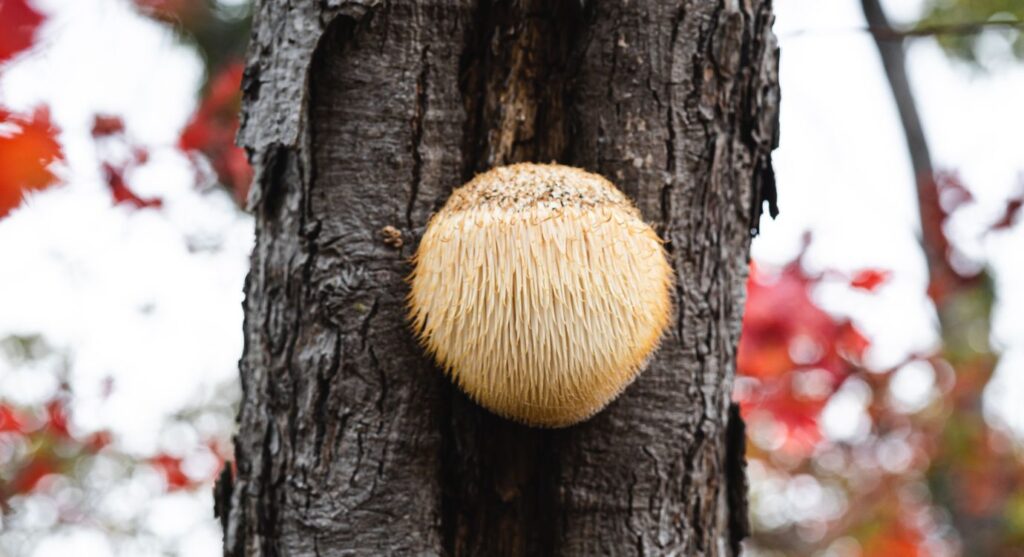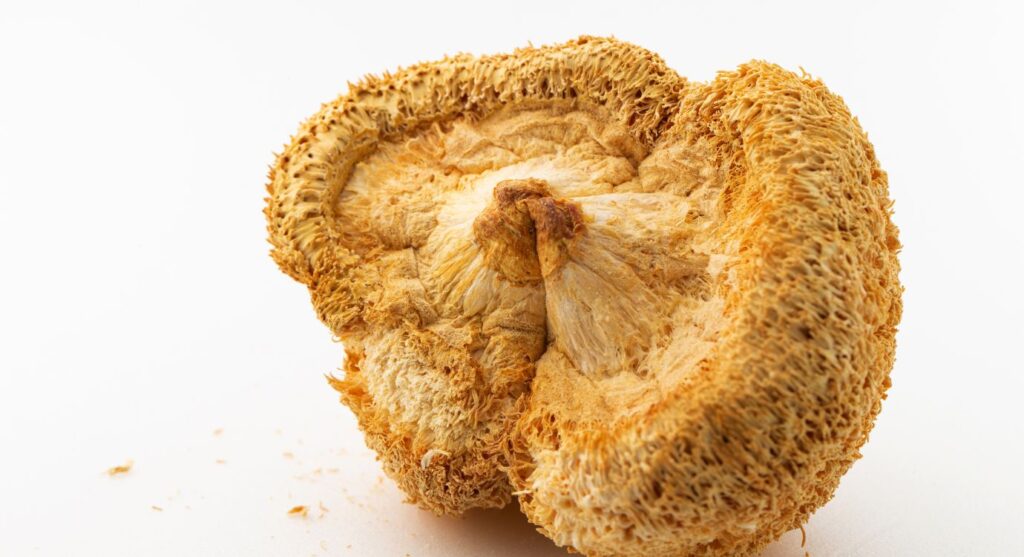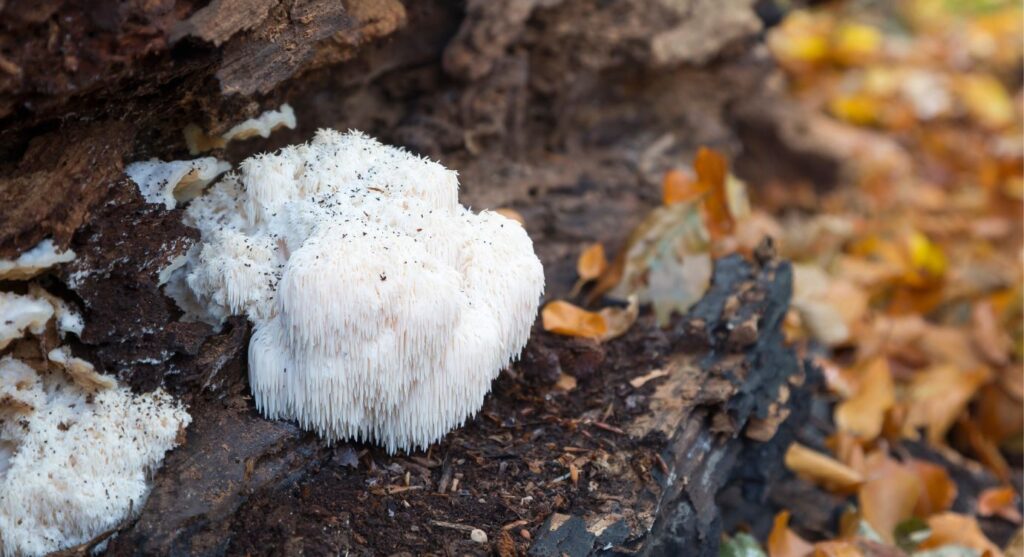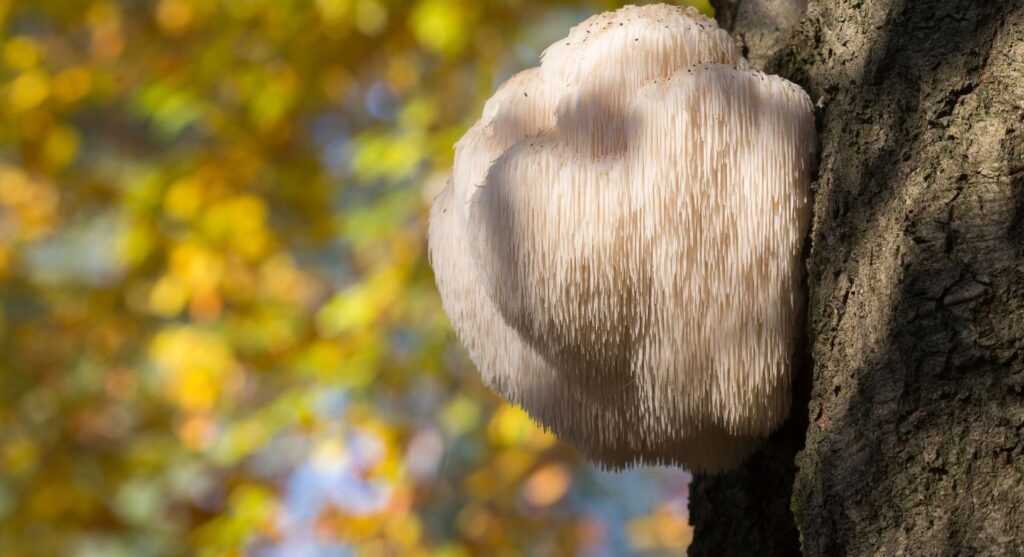Free delivery on all orders over £45
Free delivery on all orders over £45

Medically reviewed by
If you’ve not yet heard of Lion’s mane mushrooms, it’s time to get clued up.
A type of mushroom native to North America, Europe and Asia, lion’s mane is also thought to be a powerful adaptogen.
Just like CBD, Lion’s Mane doesn’t have clinical applications. It’s not a treatment for disease or illness – and it won’t cure you.
But if you are looking for a supplement to help support balance within the body, lion’s mane could be the perfect addition to your natural wellness toolkit. Here’s everything you need to know about this distinctive fungi, including
Okay… let’s rewind for a quick definition.
An adaptogen is a plant or herb thought to help the body to adapt to stress. Like CBD, adaptogens are thought to help contribute to the maintenance of homeostasis in the body.
They are also often praised for their immune-boosting and anti-inflammatory qualities.
And yes, lion’s mane is an adaptogen.
It’s actually one of the most common adaptogens available – if you ever walk into a health shop, you’re likely to spot it in capsule, tincture, tea or powdered form.
Lion’s mane is often promoted as a remedy for many common health problems, including:
Currently, scientific support for any of these health claims is very limited, but there are some clinical studies worth paying attention to.
While there are limited human trials, there are findings available from animal trials and test-tube studies.
As alluded to earlier, it’s important to remember that while this supplement may often be marketed aggressively and promise excellent results, it’s not a medicine. Only medicines can make claims to cure or even treat health conditions.
With that said, here are six potential benefits of lion’s mane mushrooms and a quick overview of the supporting science.
Lion’s mane mushrooms are rich in antioxidants which help to fight inflammation and oxidation throughout the body.
In a study of 14 mushrooms, lion’s mane was found to have the fourth highest antioxidant levels.
Inflammation is linked to conditions such as heart disease, diabetes and some autoimmune conditions. Reducing inflammation and oxidation is also thought to help boost immune function.
Read more: Mushrooms for inflammation
Research on mice has found that lion’s mane mushrooms helped to boost immune activity in the intestines.
And another study in mice found that lion’s mane mushrooms helped to promote the growth of good bacteria in the gut, which is also linked to a strong immune system.
Lion’s mane mushrooms are rich in beta-glucans, which are sugars found in the cell walls of fungi.
They are an excellent source of dietary fibre, but are also thought to help to reduce cholesterol.
One study found that when lion’s mane was mixed with human cancer cells in a test tube, the cancer cells died off at a faster rate.
However, other studies have failed to replicate this result, so more research is needed to understand if this could be a potential cancer treatment.
Those looking at adaptogenic mushrooms for mental health disorders may be interested to learn that lion’s mane has been proven to reduce depressive behaviour in mice.
Again, this is thought to be linked to the anti-inflammatory benefits.
A small-scale study in Japan found that women with a range of health complaints including menopausal symptoms and poor sleep found some relief when taking lion’s mane.
The participants ate cookies with lion’s mane extract or a placebo for four weeks. The group taking the extract reported a reduction in their symptoms, including irritation and anxiety.
Read more: Mushrooms for anxiety
Lion’s mane has also been the subject of research into cognitive health and associated conditions.
In one study, mice given lion’s mane supplements demonstrated better object recognition and memory.
And in a small-scale study in Japan, participants aged between 50 and 80 were given a daily lion’s mane supplement for 16 weeks.
Those taking the supplement scored higher cognitive function scores than those taking a placebo.
The study also found that their scores dropped when they stopped taking the supplement.
If you’re adding whole lion’s mane mushrooms to your diet, you should always cook them until the outer layer is crisp. We should probably pre-warn you: the taste can be quite bitter if they are undercooked.
If you’re not a committed chef, an easier way to add lion’s mane to your diet may be with a supplement. As we mentioned, this can take lots of forms – capsules, tinctures, teas, coffees or powders – and will be easy to find in health shops or online.
Lion’s mane supplements will often include other ingredients that help to increase absorption rates. This commonly includes ingredients like black pepper, cumin and ginger.
However you choose to take lion’s mane supplement, it’s essential to follow the instructions on the packaging to ensure you take the correct dosage and stay within product guidelines.

Animal studies suggest that lion’s mane is safe, even in high doses. However, if you have a mushroom allergy, you should avoid taking supplements containing lion’s mane and any other adaptogenic mushrooms.
There have been some reported cases of allergic reactions to lion’s mane. An allergic reaction could lead to skin rashes or breathing problems.
There is also the risk of an allergic reaction to additional ingredients in your supplements. And if the supplements are of poor quality, there is always the risk of contamination.
“What about if I’m pregnant?”
There isn’t enough research to know lion’s manes risks while pregnant or breastfeeding. So, without further knowledge, avoiding supplements while pregnant or breastfeeding is always best.
“Does Lion’s mane have any side effects?”
There have never been any controlled clinical human studies that have specifically examined lion’s mane mushrooms’ side effects, so we can’t say anything definitively.
But, we can point to hundreds of years of seemingly safe use in Traditional Chinese Medicine (TCM) and a plethora of anecdotal evidence that suggests lion’s mane is very safe.

While lion’s mane is generally perceived as very safe, there are still risks of using lion’s main – as alluded to above. If you’re allergic to mushrooms, pregnant or breastfeeding, stay away from Lion’s mane and any derived supplements.
If you take any medication, you should check with your GP or pharmacist before adding any supplements to your routine.
Lion’s mane could decrease blood clotting and lower blood sugar levels, so it’s essential to know how this could impact other medications.
Lion’s mane is not a ‘magic’ mushroom – it has no hallucinogenic or psychoactive effects and is not a controlled or regulated substance.
As such, you don’t need to worry about getting high from Lion’s mane. As it doesn’t alter your perception, it’s safe to use while driving.

“But will lion’s mane make me fail a drug test?”
There’s no need to worry about that, either – this supplement is not a drug.
Standard testing would not pick up traces of the supplement, so, there is no danger that lion’s mane will show up on a drug test!
Taking lion’s mane regularly does not increase tolerance or addiction.
You should have no adverse side effects or withdrawal symptoms when you stop taking the supplement.
This is one reason it may be considered an attractive alternative to medication for depression, including SSRIs (although it is not a medicine and should never be treated as such).
If you are taking SSRIs or other antidepressants and want to explore alternative options, always consult with your GP before making any changes.
While we don’t (yet) have any cold hard science to back up a plethora of anecdotally reported lion’s mane benefits – we might soon.
“Test tube” and lab mice studies have so far proved promising. And with lion’s mane having been used in Traditional Chinese Medicine practices for centuries – we’d these ‘bushy’ looking adaptogens may just be the natural secret to help promote wellness.
10% off on your first order
Complete this one-minute quiz and find the right products for you.
Sign up for the Evopure newsletter:
This product is not for use by or sale to persons under the age of 18. It should not be used if you are pregnant or nursing. Consult with a physician before use if you have a serious medical condition or use prescription medications. A Doctor’s advice should be sought before using this and any supplemental dietary product. This product is not intended to diagnose, treat, cure or prevent any disease.
© Evopure Ltd. All rights reserved Terms & Conditions Cookie Policy Sitemap